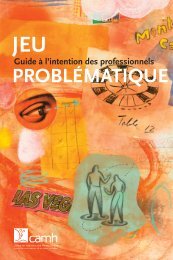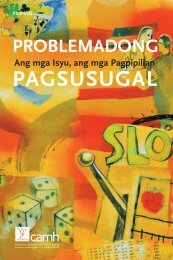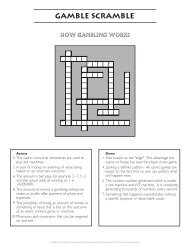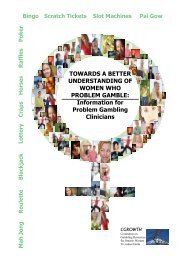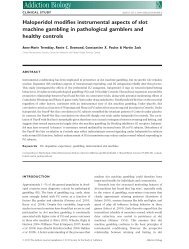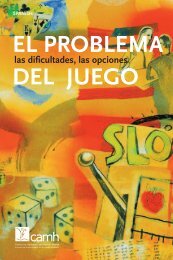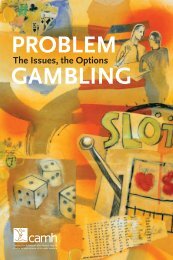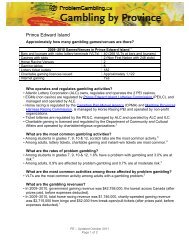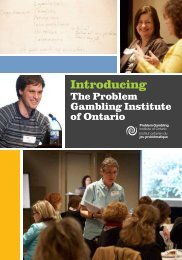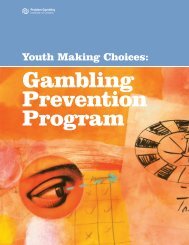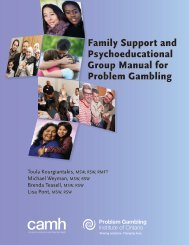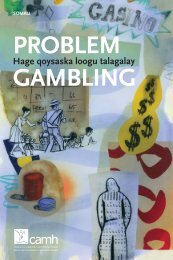Problem Gambling - A Guide for Families (PDF) - ProblemGambling.ca
Problem Gambling - A Guide for Families (PDF) - ProblemGambling.ca
Problem Gambling - A Guide for Families (PDF) - ProblemGambling.ca
You also want an ePaper? Increase the reach of your titles
YUMPU automatically turns print PDFs into web optimized ePapers that Google loves.
<strong>Problem</strong> <strong>Gambling</strong>: A <strong>Guide</strong> <strong>for</strong> <strong>Families</strong><br />
win while trying to change, the problem <strong>ca</strong>n seem less urgent.<br />
For those who have been working successfully on change, it<br />
is not unusual <strong>for</strong> an unexpected trigger or a buildup of stress<br />
to lead to relapse. It is difficult to make changes consistently<br />
without ever making a mistake. Relapses are very hard on<br />
everyone, and should be avoided if at all possible. But if they<br />
do happen, they do not have to lead to disaster.<br />
If a relapse occurs the goal is <strong>for</strong> the person to stop the gambling<br />
as soon as possible, work on understanding what led to<br />
the relapse, and plan how to better deal with the trigger that<br />
<strong>ca</strong>used the gambling slip.<br />
You <strong>ca</strong>n help by treating the relapse as serious, but not as a<br />
reason to despair. Treat it as a learning opportunity, to be<br />
worked on as a team if possible.<br />
Your help and<br />
support are<br />
important to<br />
the person with<br />
a gambling<br />
problem, but it<br />
is still the<br />
person’s own<br />
responsibility<br />
to fix the<br />
problem.<br />
However, if relapses continue to happen, and/or the person is<br />
not taking them seriously, understand that they are no longer<br />
in the “action” stage of change. They have slipped back to<br />
stage 1 or 2. Your actions need to match their stage of change.<br />
Some people stop gambling, but replace it with drinking or taking<br />
other drugs, or with excessive internet use, shopping or<br />
other problem behaviours. Such behaviours should be discussed<br />
with a therapist, to make sure the person is not simply replacing<br />
one problem with another. Sometimes this behaviour may settle<br />
down as the person learns to enjoy life without gambling and<br />
sometimes more intense help and support may be needed.<br />
Some families find it hard to believe that counselling will help<br />
during this difficult stage. However, <strong>for</strong> most people, it does help.<br />
* Adapted from<br />
Addictions Services<br />
Kenora problem<br />
gambling materials.<br />
Communi<strong>ca</strong>ting Clearly<br />
It is important to tell the person how his or her behaviour<br />
affects the family. People with gambling problems often enter<br />
28



